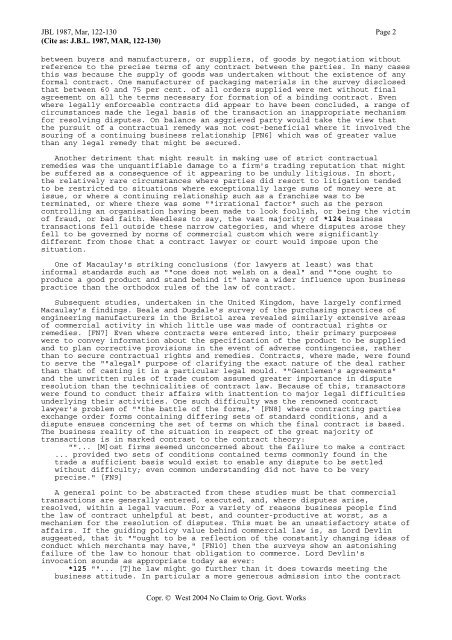Tesco v Constain - Thomson Reuters
Tesco v Constain - Thomson Reuters
Tesco v Constain - Thomson Reuters
You also want an ePaper? Increase the reach of your titles
YUMPU automatically turns print PDFs into web optimized ePapers that Google loves.
JBL 1987, Mar, 122-130 Page 2(Cite as: J.B.L. 1987, MAR, 122-130)between buyers and manufacturers, or suppliers, of goods by negotiation withoutreference to the precise terms of any contract between the parties. In many casesthis was because the supply of goods was undertaken without the existence of anyformal contract. One manufacturer of packaging materials in the survey disclosedthat between 60 and 75 per cent. of all orders supplied were met without finalagreement on all the terms necessary for formation of a binding contract. Evenwhere legally enforceable contracts did appear to have been concluded, a range ofcircumstances made the legal basis of the transaction an inappropriate mechanismfor resolving disputes. On balance an aggrieved party would take the view thatthe pursuit of a contractual remedy was not cost-beneficial where it involved thesouring of a continuing business relationship [FN6] which was of greater valuethan any legal remedy that might be secured.Another detriment that might result in making use of strict contractualremedies was the unquantifiable damage to a firm's trading reputation that mightbe suffered as a consequence of it appearing to be unduly litigious. In short,the relatively rare circumstances where parties did resort to litigation tendedto be restricted to situations where exceptionally large sums of money were atissue, or where a continuing relationship such as a franchise was to beterminated, or where there was some ""irrational factor" such as the personcontrolling an organisation having been made to look foolish, or being the victimof fraud, or bad faith. Needless to say, the vast majority of *124 businesstransactions fell outside these narrow categories, and where disputes arose theyfell to be governed by norms of commercial custom which were significantlydifferent from those that a contract lawyer or court would impose upon thesituation.One of Macaulay's striking conclusions (for lawyers at least) was thatinformal standards such as ""one does not welsh on a deal" and ""one ought toproduce a good product and stand behind it" have a wider influence upon businesspractice than the orthodox rules of the law of contract.Subsequent studies, undertaken in the United Kingdom, have largely confirmedMacaulay's findings. Beale and Dugdale's survey of the purchasing practices ofengineering manufacturers in the Bristol area revealed similarly extensive areasof commercial activity in which little use was made of contractual rights orremedies. [FN7] Even where contracts were entered into, their primary purposeswere to convey information about the specification of the product to be suppliedand to plan corrective provisions in the event of adverse contingencies, ratherthan to secure contractual rights and remedies. Contracts, where made, were foundto serve the ""alegal" purpose of clarifying the exact nature of the deal ratherthan that of casting it in a particular legal mould. ""Gentlemen's agreements"and the unwritten rules of trade custom assumed greater importance in disputeresolution than the technicalities of contract law. Because of this, transactorswere found to conduct their affairs with inattention to major legal difficultiesunderlying their activities. One such difficulty was the renowned contractlawyer's problem of ""the battle of the forms," [FN8] where contracting partiesexchange order forms containing differing sets of standard conditions, and adispute ensues concerning the set of terms on which the final contract is based.The business reality of the situation in respect of the great majority oftransactions is in marked contrast to the contract theory:""... [M]ost firms seemed unconcerned about the failure to make a contract... provided two sets of conditions contained terms commonly found in thetrade a sufficient basis would exist to enable any dispute to be settledwithout difficulty; even common understanding did not have to be veryprecise." [FN9]A general point to be abstracted from these studies must be that commercialtransactions are generally entered, executed, and, where disputes arise,resolved, within a legal vacuum. For a variety of reasons business people findthe law of contract unhelpful at best, and counter-productive at worst, as amechanism for the resolution of disputes. This must be an unsatisfactory state ofaffairs. If the guiding policy value behind commercial law is, as Lord Devlinsuggested, that it ""ought to be a reflection of the constantly changing ideas ofconduct which merchants may have," [FN10] then the surveys show an astonishingfailure of the law to honour that obligation to commerce. Lord Devlin'sinvocation sounds as appropriate today as ever:*125 ""... [T]he law might go further than it does towards meeting thebusiness attitude. In particular a more generous admission into the contractCopr. © West 2004 No Claim to Orig. Govt. Works
















